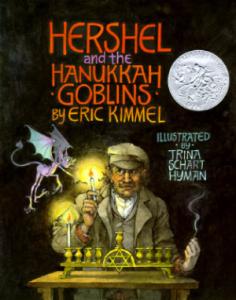Because when I think of goblins, I think of Hanukkah.

It's basically like a cross between The Brave Little Tailor and the Three Billy Goats Gruff. Hershel is journeying somewhere, and Hanukkah is coming up. He gets to a village, apparently populated entirely by Jewish people, but they don't celebrate Hanukkah because there's a bunch of goblins who live in an old synagogue at the top of the hill who hate Hanukkah. Anti-Semitic goblins living at the top of this hill that terrorize the city. The only way for him to get rid of the goblins is for someone to spend eight nights in the synagogue and light the Hanukkah candles in the menorah, and on the eighth night, the king of the goblins has to light them himself.
So Hershel has to basically trick the goblins that come on the first seven nights into leaving him alone, and then trick the king of the goblins into lighting the menorah. On the first day, there's a little tiny goblin that he scares away by crushing a hard-boiled egg and claiming that it's a rock (obviously cribbed from The Brave Little Tailor folktale). On the second night, there's a big fat goblin that he tricks into putting his hand into a jar of pickles, but since he's too greedy to let go of the pickles, he can't get his hand back out because (like the raccoon traps I read about in "Where the Red Fern Grows"). He's so mad when he finds out that the only thing keeping his hand in there was his own greed, he actually stomps his foot and shatters. The third goblin comes, and Hershel shows him a dreidel and how to gamble with the dreidel, but makes up his own rules so that the Goblin always is the one giving the money away and Hershel never gives any money away (a "heads I win; tails you lose" situation). Then it just says, "On the following nights, other goblins came. One had six heads. One had three eyes. All were terrible and fierce. They growled and roared and changed themselves into horrible shapes. They tried to stop Hershel from lighting the Hanukkah candles. But Hershel fooled them all." It feels like the author just couldn't think of any other ways to trick people, or else just got bored. It's pretty much a cop-out: "And some more stuff happened."
On the seventh night, the king of the goblins just yells at him from a long distance away, trying to scare him. On the eighth night, the king of goblins comes and Hershel claims to not know who he is. He pretends to think the goblin king is a boy or an old woman or something, adding that it's dark in there and why doesn't the stranger light some candles so he can see. Then the king lights all the candles and says something like, "Now you know who I am!" And Hershel's like, "Yeah, go away." Because, "You thought those were ordinary candles you were lighting. They weren't. They were Hanukkah candles. And you lit them yourself!" Woo. The king is so mad that he destroys the old synagogue, and the only thing left is the table that the menorah is on, and Hershel's like, "whatever," and then he goes down to the the village where everybody's waiting for him.
I like it when trickster tales have the trickster defeating evil, but it's kind of pointless if the evil is stupid. It's not like these goblins were hard to fool, and he like kind of acts like he's hot stuff and clever. "'I'm not afraid, rabbi,' Hershel said. 'If I can't outwit a few goblins, then my name isn't Hershel of Ostropol.'" Maybe he's not saying he's clever; he's just saying that goblins are stupid.
Beyond that, you get into the mythology of this. We've got Hanukkah, we've got Jewish people, and then we've got... goblins? There's no goblins in the Bible. I'm pretty sure gums don't really exist. It's not like Hershel's actually casting magic spells or anything like that, it makes it more like a fairy tale than anything else. Which is kind of odd because it's clear that what they're trying to do is teach the reader about the power of Hanukkah. I'm not sure the book even mentions God.
There's an afterword that describes the story of Hanukkah, what a menorah is, and the actual rules of gambling with the dreidel. It's preachy and it just copies from other fairy tales (not like they're not in the public domain or anything) but it's really just lazy. It's good quality artwork, I'd say, but it's not enough to rescue the preachiness of the story. I'm not Jewish, so it's not really my culture, so maybe if it was my culture it'd be a fun way of getting this information across? But there's really not that much actual information getting across. For all its talk about the power of the menorah, almost all the references to Hanukkah could really be swapped out with any kind of magical system and the story would be basically the same.
When I teach my children about Hanukkah, I'll use a different method, because I prefer to stick to the facts of a culture. If this was like a traditional Jewish folktale, that might be different.